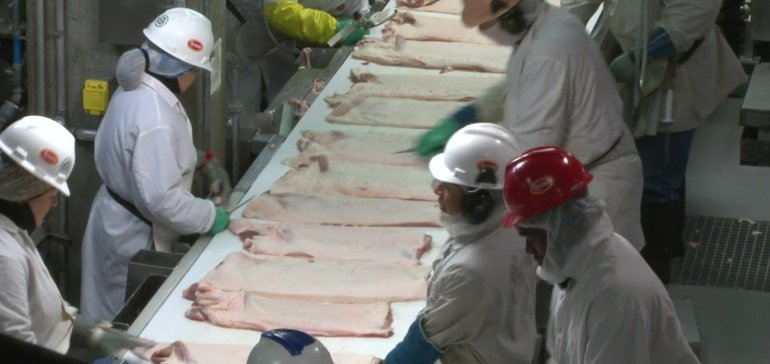Meatpackers fail to secure protection with new OSHA COVID-19 safety rule

Dive Brief:
- The Occupational Safety and Health Administration has issued guidance for employers in meat, poultry and seafood processing, grocery, retail and manufacturing to protect worker health as the pandemic eases. The agency suggested measures such as staggering breaks and arrival times, providing visual cues as a reminder to maintain physical distancing, improving ventilation and spacing out unvaccinated or otherwise at-risk workers.
- OSHA decided to omit these industries from a new emergency temporary standard that requires employers in high-risk industries such as healthcare to provide certain worker protections from COVID-19. This drew the ire of a large union group. “The current COVID safety guidelines in place are unenforceable,” Marc Perrone, president of the United Food and Commercial Workers, said in a statement. “What was released by the Administration completely ignores the health threat grocery and meatpacking workers are still confronting.”
- The meatpacking industry as a whole was hit particularly hard during the early stages of the outbreak last spring. Unions, activists, workers and family members criticized the meat industry for waiting too long to put additional safety measures in place.
Dive Insight:
While OSHA decided only to apply mandatory COVID-19 worker safety requirements to the healthcare industry, meat and poultry processing companies that employ thousands of individuals in this space will need to remain vigilant.
Debbie Berkowitz, worker health and safety program director at the National Employment Law Project who previously was as a senior OSHA official during the Obama administration, said in an email the administration’s decision “did not in any way relieve the meatpacking industry of their legal obligation to provide a safe workplace.”
She highlighted the fact that meatpacking and poultry companies in the U.S. have been hit hard by COVID-19 and workers in these facilities face high risks of infection. In addition, fewer than half of all adults have been fully vaccinated in the country, and in many meat and poultry plants that rate is even lower.
“This decision to limit the standard’s coverage to healthcare is more about the limits of the OSHA law, and the legal burdens the agency must meet to promulgate an ’emergency’ standard,” Berkowitz said.
The updated guidance may help to resolve some of the questions employers had following a May update from the Centers for Disease Control and Prevention that said, with some restrictions, fully vaccinated individuals could resume activities without wearing a mask. Last month, OSHA directed employers to follow CDC’s guidance on mask use and social distancing for fully vaccinated workers.
The decision to give only guidance to meat processing companies could potentially further discourage people from taking a job in the industry if they’re concerned about getting COVID-19. The animal slaughtering and processing industry employs more than 515,000 individuals. The North American Meat Institute, which represents companies of all sizes throughout the meat industry, did not respond to a request for comment on OSHA’s announcement.
On average, between 3% and 18% of the workforces of the largest meat and poultry companies have tested positive for the virus, according to data reviewed by Food Dive in November. The UFCW has estimated more than 22,000 meatpacking workers have been infected or exposed, with at least 132 dying from COVID-19. The union group said it would continue to press OSHA for stronger oversight.
“The reality is that voluntary guidelines are not enough on COVID safety,” Perrone said. “UFCW will be pushing OSHA to immediately increase workplace safety inspections in grocery stores, meatpacking plants, and healthcare facilities to make sure workers are kept safe and all employers are held accountable for protecting them on the job.”
Companies that process beef, pork and chicken already are struggling to fill vacancies amid a shortage of workers and strong demand for protein, so additional staffing difficulties could make it even harder for them to run their operations. Currently, some businesses have curtailed production to focus on the most in-demand items due to a staffing shortage.
“We definitely have some plants that are struggling a little more than others” when it comes to finding enough workers, Hector Gonzalez, Tyson’s senior vice president of human resources, said recently. “If people aren’t there, our plants won’t run, so it is more challenging these days to see the kind of applicant flow necessary to fill the gaps.”
Meat companies, including Tyson, Smithfield Foods and JBS, have spent millions of dollars offering bonuses to employees and retrofitting plants to mitigate the spread of the coronavirus. Tyson spent at least $600 million on coronavirus-related measures in fiscal year 2020, including about $300 million in bonuses and other benefits for workers.
The industry as a whole may have to take additional precautions in order to retain hesitant workers and attract new employees. These actions could include safety measures that haven’t already been implemented or a costly and time-consuming option of opening new facilities that would allow workers to have more space.
Meat and poultry companies have been boosting worker pay for years, but additional increases to their benefits are all but assured going forward. Without further action that gives employees an incentive to come to work, meat and poultry processors could lose more people to less risky, more protected industries.
Source: fooddive.com

